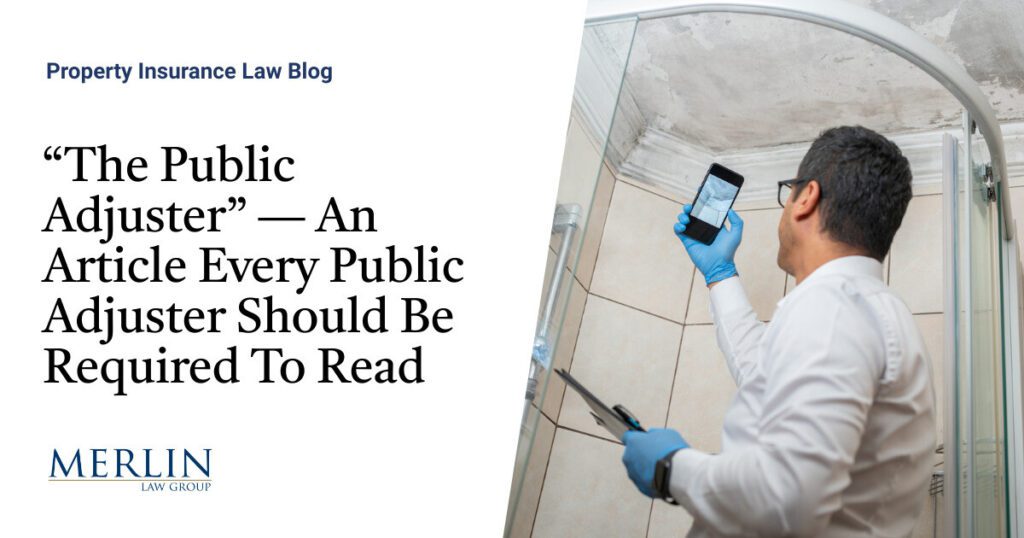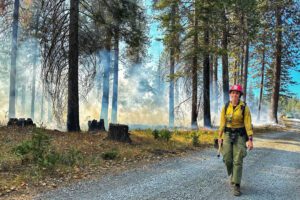“The Public Adjuster” — An Article Every Public Adjuster Should Be Required To Read

Harvey Goodman’s interview in Harvey Goodman in the Public Adjuster Spotlight, answered one question with the following sentence: “Will Goodman wrote an article for Best’s Guide in 1951 that seems as if it could have been written today.” After reading the article, The Public Adjuster, 1 it is obvious that this is a masterful discussion of property insurance claims, the need for policyholders to receive professional help, and the high bar that is needed to be a public adjuster.
Everybody in the property insurance claims business would be better for reading Goodman’s article and focusing on the issues and implications raised by the article published in a major national insurance industry publication. His insights are as relevant today as when published 73 years ago and apply to all claims professionals, although his center of focus was on the importance of professionalism, ethical conduct, and continuous education in the field of public adjusting.
Will Goodman begins the article by addressing the concept of public relations within the insurance industry. He criticizes the insurance industry for historically placing public relations emphasis on selling insurance policies and not enough on the proper handling of adjustments. He suggests that this has led to a lack of trust and satisfaction among policyholders when they make a claim.
One of the critical issues raised by Goodman is the problem of inexperienced adjusters. Does this sound familiar in 2024? Goodman noted:
Losses should be assigned to men acknowledged to be professionals, and the Industry should require the raising of standards of adjusters, make the qualifications more exacting, and advocate the enactment of proper state regulatory laws in states where they do not now exist (that is, laws fair to the public, the insurance companies and to the industry) thereby eliminating any unqualified, inexperienced or unscrupulous adjusters now in practice.
What is to be done about the adjusters who could not qualify? The answer is simple; the process, difficult but fruitful. They must be educated. Through study and application, they must improve their standing in the business or the profession will go forward, leaving them far behind. By this means the vast expanding insurance industry keeping before it primarily the public interest, forgetting selfish expediency and personal gain, can acquire a magnificent reward; public acclaim and industry advancement.
The problem is that the insurance industry did not do this. Indeed, the problems arising from inexperienced and non-qualified property insurance adjusters seem just as great today as when Goodman long ago addressed the issue and stated the obvious but difficult, answer to the concern.
Goodman then defines the role of a public adjuster. The qualifications and skills required for public adjusters are stringent. Goodman emphasizes that public adjusters must have an unquestioned moral character, thorough knowledge of standard insurance policies, and the ability to provide sound, accurate advice on insurance matters. They must be proficient in computing losses. Furthermore, public adjusters should possess extensive knowledge of business practices, commercial laws, accounting principles, construction methods, and merchandising techniques if they are to properly represent a commercial policyholder. They must be capable of preparing detailed inventories of damaged and undamaged property and understanding the costs and methods of repairing and installing machinery.
Goodman highlights the importance of public adjusters in fostering trust and cooperation between policyholders and insurance companies. Public adjusters play a critical role in ensuring smooth loss adjustments by promoting confidence and understanding. They act as intermediaries, helping to resolve misunderstandings and disputes between policyholders and insurers. A competent and reputable public adjuster earns the trust of both the policyholder and the company adjuster, facilitating fair and efficient settlements.
The relationship between public adjusters and attorneys is also significant. In the past, some lawyers viewed the work of public adjusters as an encroachment on the practice of law. However, Goodman notes that the functions of public adjusters are distinct from legal practice and fulfill a unique need within the insurance industry. Lawyers increasingly recognize the value of public adjusters in handling and preparing fire loss claims for their clients. Public adjusters provide specialized expertise that complements the legal work of attorneys, aiding in the successful resolution of claims.
Goodman traces the historical development of the public adjusting profession. Prior to 1880, there were no public adjusters. The profession emerged around the turn of the 20th century, initially comprising individuals of varying reputations and ethical standards. Over time, regulatory laws were enacted to license and control the profession, ensuring honest dealings and proper conduct.
Goodman’s view on the future of the public adjusting profession in 1951 depends on continuous improvement and adaptation. Goodman stresses that the profession must uphold high standards and adapt to the growing complexity of the insurance industry. States without regulatory laws should enact statutes to regulate public adjusters, and professional societies should enforce strict ethical codes. Membership in such organizations should symbolize professional character and achievement, ensuring the profession’s respect and future growth.
Will Goodman’s article is significant because it explains the vision of what public adjusting could be as a profession from its first elected leader. I would suggest all public adjusters reflect on the call for raising and demanding high standards of those entering and maintaining a place in the field of public adjusting. It might not be easy, but “the hard” is what makes any endeavor valuable.
The article is available at this link.
Thought For The Day
Perfection is not attainable, but if we chase perfection we can catch excellence.
—Vince Lombardi
1 William Goodman, The Public Adjuster, Best’s Insurance News, Fire and Casualty Edition (Feb. 1951).



